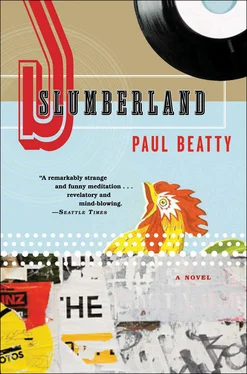The band had been onstage for more than ten minutes and hadn’t played a solitary note. Thus far the concert consisted of the star attraction Marcel Marceau-ing across the stage in his socks. I didn’t care if the quiet was stupefied awe for his tipsy traffic-cop Butoh minuets or impatient politeness for his double-jointed Thai stripper contortions. This was as close to the tranquility of deafness as I would ever get. For the first time in my life I’d forgotten my sonic past. My head hushed as the eighteen minutes of erased Watergate tape played in deep space. It was the blissful quietude of being buried alive in cotton. An indelible nothingness I would remember for the rest of my life.
The Schwa’s body began its physical decrescendo. He weaved across the stage like a concussed Movietone stooge slowly regaining his slapstick equilibrium after a blow to the head. He stepped back into his oxfords as if they were bedroom slippers and shuffled to center stage. From the back of the room a cry went up. The skinheads, led by Thorsten, whooped and stomped their feet in appreciation because the silence had finally broken. I turned on my digital recorder. In the gradually dimming room the red recording light glimmered like a distant star in a pitch-black universe.
The Schwa pressed the red button and it was, World, meet Charles Stone. Charles Stone, World. How do you do? Nice to meet you. It’s a pleasure.
The Listening Experience
Defying all the laws of acoustics and containing only the barest characteristics of tonality and melody, the Schwa’s sound was music in the sense that prison gruel is food. The opening composition, a dirge deluge entitled “Fatima,” was a profane flash flood of auditory tyranny that hurtled downhill with such force it literally knocked me off my feet. I felt like I was listening to a family of hillbillies reading Philip Roth aloud in a backwoods mountain hollow; each movement an endless filibuster so dense and pedantic that any one speaker, one paragraph, one instrument became indistinguishable from another.
As I struggled to stay afloat, I wondered how the lay listeners on the outside were coping with the free-jazz tsunami. I imagined a scene quite similar to the one that opened 2001: A Space Odyssey —the Berlin primordials, in the ill-fitting monkey suits of the day, growling and bounding around the unwelcome-sound monolith. It’d be chaos until one brave soul reached out to touch the wall; then there’d be change. Fundamental no-turning-back change.
There’s an old Buddhist saying, “Before enlightenment, chop wood, carry water. After enlightenment, chop wood, carry water.” So I picked myself up off the floor — fought back against this torrential downpour of pig calls and tuba bellows by going back to basics. Desperately I tried to wrap my mind around the drumming, but Irrawaddy went into this flimflam paradiddle sextuple ratatap, and the tenuous grip I had on sanity and the tune were broken. Thirty more seconds of her impeccable drum work caused my ego to slide off an inverted ratamacue in the obstinato voice as if it were a wet, slippery, moss-covered river rock in an Appalachian class-five rapid. Barely able to keep my head above water, I gave myself up to the current. Surrendered to the sound, waiting, praying, for the next eddy of cacophony to pick me up, smash my head against the rocks, and put an end to my misery. However, floating among the flotsam of brassy detritus, rushing past my ears — a simple elongated note. A distant overhead trumpet screed that had more in common with the ominous drone of a B-52 flying at twenty-five thousand feet than it did with jazz.
I latched onto this heaven-sent piece of Acadian driftwood, but it wasn’t heavy enough to support me. Another wave of dia-tonic chords, and I was resubmerged in the horn section’s slip-stream. Too tired to surrender, I decided to just sit there on the floor until the storm subsided. Knowing that in the morning the authorities would find my bloated, improvisation-logged body on the Slumberland floor buried under alluvial layers of sedimentary jazzbo. From behind, just as I had given up all hope, a suntanned-lifeguard-brown arm wrapped itself across my chest and dragged me to the river’s edge. Backs against the wall, we slumped to the floor. The hand tapped a beat on my heart. Doomp-doomp tshk da-doomp-doomp tshk doomp-doomp tshk . . And there it was, a sardonic sonic pun buried beneath the pounding piano, the keening horns and the epileptic bass line: The violinist quietly quoting Eric B. and Rakim’s “My Melody” was the melody. Doomp-doomp tshk da-doomp-doomp tshk doompdoomp tshk . . Her hand still tapping my chest, Klaudia von Robinson and I headed back out into the rushing waters, determined to ford the unfordable.
YOU KNOW HOW when a soprano hits that note and the wineglass breaks? The Schwa’s music does that, except instead of breaking glass, it shatters time. Stops time, really.
Whenever I hear about a method of time travel that involves wormholes, flux capacitors, or cosmic strings and no music I’m not impressed. If there is such a thing as a vehicle for time travel it’s music: Ask any brokenhearted Luther Vandross fan.
I used to be obsessed with stoppages in time. Whenever I saw the dog acting funny, I’d think he was forecasting an earthquake. So I’d run inside and set the kitchen clock precariously on the nail nubbin, so that when the big one hit, our fractured family clock would join the famous timepieces stopped by cataclysms, like the frozen wall clock from the Great Alaska Earthquake and the smashed Waiakea town square clock lying in the rubbled aftermath of the 1960 tsunami. In high school I was an above-average athlete who rarely saw the field of play because I’d call time-out for no reason other than to see the scoreboard clock come to a halt. Every spring and fall at the onset of daylight savings time I’d call the time, hoping to hear time stop and repeat itself. In L.A. the number was 264-1234; three hollow rings, and the time would answer. The time was a woman. A husky-voiced female who got straight to the point: “At the sound of the tone, the time will be eleven thirty-three p.m. and ten seconds.” Beep . No hello or nothing. “At the sound of the tone. .” Man, I miss her. With the Schwa’s band tearing a hole in the space-time-music continuum, I felt like calling the time right then and there. Press the receiver to my ear so I could hear her say, “At the sound of the tone the American Negro will be passé, and I for one couldn’t be happier.” Beep .
When the Schwa called me onstage for the encore, I somnambulantly approached the bandstand. The carnage was everywhere. It was as if some suicide sound bomber had detonated his explosive belt in the middle of the room. People, seats, and sensibilities were scattered about the room. Though the band had stopped playing, the music still rang in everyone’s ears. The audience still tumbled and swayed in the eerie disharmony of a North Korean gymnastics troupe celebrating May Day on acid and half rations. In the darkness I found myself stepping over prostrate bodies and bumping aside zombified audience members. The Schwa’s set had blown minds, and all that remained was the smithereens of a pre-Schwa, post-commercial consciousness.
I took my place behind the turntables, my hands shaking so uncontrollably I could barely put the record on the spindle.
“PTSD!” someone shouted.
A peal of laughter rippled the room. They were right, of course; we were all indeed suffering from post-traumatic stress disorder. My case being especially acute because I had to follow in the Schwa’s brilliant wake. To ease my nerves I did what we all do in times of crisis: I turned to the cliché. Peering through the darkness into the packed house, I imagined the audience naked, but in this case the old adage was of no help because half the audience really was naked. In back of the room couples clung to each other in the infamous Yoko-and-John-Lennon Rolling Stone pose. A conga line of streakers, including Thorsten and Nordica, molted from their clothes and deliriously snaked their way through the audience. A man stood at the front of the bandstand wincing as he pulled the hair from his nipples. The sympathetic African sandwich peddler gave him a rose and a hug.
Читать дальше












